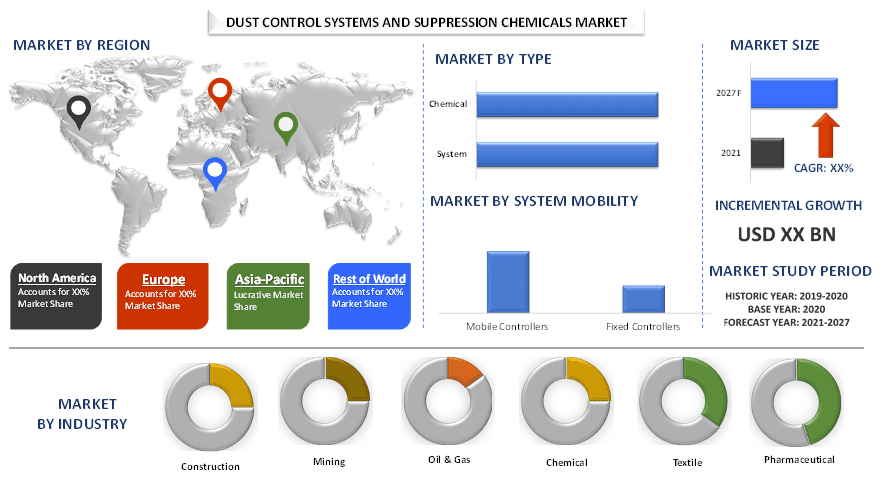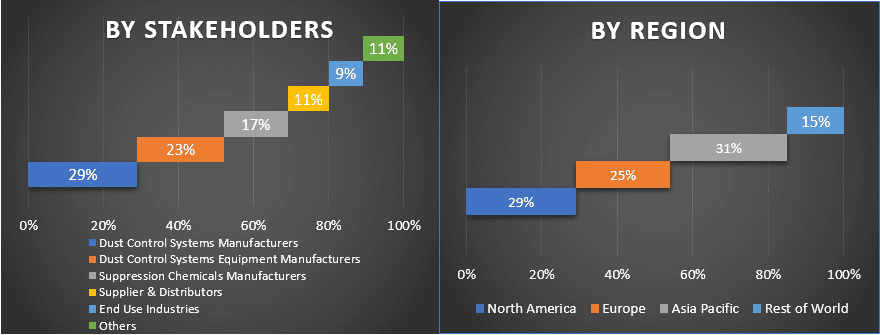- Home
- About Us
- Industry
- Services
- Reading
- Contact Us
Dust Control Systems and Suppression Chemicals Market: Current Analysis and Forecast (2021-2027)
Emphasis on Type ({System [Dry Collection (Bag Dust Collectors, Cyclone Dust Collectors, Electrostatic Dust Collectors, Vacuum Dust Collectors, and Modular Collectors) and Wet Suppression (Wet Scrubbers and Wet Electrostatic Precipitators)] and Chemical (Lignin Sulfonate, Calcium Chloride, Magnesium Chloride, Asphalt Chloride, Oil Emulsions, Polymeric Emulsions, and Others)}; System Mobility [Mobile Controllers (Handheld, Self-Propelled, Tractor-Mounted, and Trailed) and Fixed Controllers]; Industry (Construction, Mining, Oil & Gas, Chemical, Textile, Pharmaceutical, Food and Beverages, and Others); and Region/Country

Dust Control Systems and Suppression Chemicals Market is anticipated to display a CAGR of around 5% over the forecast period (2021-2027). Over the years upsurge in construction activities has been observed as countries are focusing more to improve their infrastructure. Construction leads to emission of dust particles which is harmful for people living in nearby areas. This has raised the requirement of dust control systems and suppression chemicals to protect the surroundings from getting polluted. Further, an efficient and reliable dust suppression solution is needed for preventive control of fugitive dust on manufacturing sites in industries involving mining, crushing and grinding of raw materials, milling and heavy equipment operation. Furthermore, rise in health awareness among consumers and rapid increasing urban area & industrialization are expected to fuel the demand for dust control systems and suppression chemicals. However, high cost of dust control systems and suppression chemicals lessens its reachability to small-scale contractors thereby restraining the market growth.
Insights Presented in the Report
“Amongst system type, wet suppression segment holds the major share.”
Based on system type, dust control systems market is categorized into dry collection and wet suppression. Dry collection includes bag dust collectors, cyclone dust collectors, electrostatic dust collectors, vacuum dust collectors, and modular collectors. Further, wet suppression is divided into wet scrubbers and wet electrostatic precipitators. Wet suppression held lucrative market share. Wet dust suppression is the use of water sprays, water guns, and mists to control fugitive dust on piles, roads, and processing operations. Dry dust collection involves the use of bag houses equipped with fabric filters. The fabric filters vacuum dust from the source to a hopper for proper disposal.
“Amongst system mobility, mobile controller segment held lucrative market share in 2020.”
Based on system mobility, dust control system market is bifurcated into mobile and fixed controllers. Mobile controllers are further divided into handheld, self-propelled, tractor-mounted, and trailed. Mobile controller held lucrative market share as they can operate where needed.
“Asia Pacific represents as the prominent region in the Dust Control Systems and Suppression Chemicals Market.”
For a better understanding of the market adoption of dust control systems and suppression chemicals, the market is analyzed based on its worldwide presence in the countries such as North America (United States, Canada, and Rest of North America), Europe (Germany, France, Spain, Italy, United Kingdom, and Rest of Europe), Asia-Pacific (China, Japan, India, Australia, and Rest of APAC), and Rest of World. Asia Pacific constituted the prominent market in the industry in 2020 owing to the rising health awareness. The region has high growth potential due to the presence of emerging countries like China, India, and Australia where mining and construction activities are at its peak. Stringent government regulations for dust control to reduce pollution is driving the market for dust control systems and suppression chemicals in the region.
Reasons to buy this report:
- The study includes market sizing and forecasting analysis validated by authenticated key industry experts
- The report presents a quick review of overall industry performance at one glance
- The report covers an in-depth analysis of prominent industry peers with a primary focus on key business financials, product portfolio, expansion strategies, and recent developments
- Detailed examination of drivers, restraints, key trends, and opportunities prevailing in the industry
- The study comprehensively covers the market across different segments
- Deep dive country-level analysis of the industry
Customization Options:
Dust Control Systems and Suppression Chemicals Market can further be customized as per the requirement or any other market segment. Besides this, UMI understands that you may have your own business needs, hence feel free to connect with us to get a report that completely suits your requirements.
Table of Content
Analyzing the historical market, estimation of the current market, and forecasting the future of the global Dust Control Systems and Suppression Chemicals adoption were the three major steps undertaken to create and analyze the adoption of Dust Control Systems and Suppression Chemicals across various segments in North America, Europe, Asia Pacific, and Rest of the world. Exhaustive secondary research was conducted to collect the historical market numbers and estimate the current market size. Secondly, to validate these insights, numerous findings and assumptions were taken into consideration. Moreover, exhaustive primary interviews were also conducted, with industry experts across the value chain of the Dust Control Systems and Suppression Chemicals sector. Post assumption and validation of market numbers through primary interviews, we employed a top-down/bottom-up approach to forecast the complete market size. Thereafter, market breakdown and data triangulation methods were adopted to estimate and analyze the market size of segments and sub-segments the industry pertains to. Detailed methodology is explained below:
Seek More Details About Research Methodology
Analysis of Historical Market Size
Step 1: In-Depth Study of Secondary Sources:
Detail secondary study was conducted to obtain the historical market size of the Dust Control Systems and Suppression Chemicals through company internal sources such as annual report & financial statements, performance presentations, press releases, etc., and external sources including journals, news & articles, government publications, competitor publications, sector reports, third-party database, and other credible publications.
Step 2: Market Segmentation:
After obtaining the historical market size of the Dust Control Systems and Suppression Chemicals market, we conducted a detailed secondary analysis to gather historical market insights and share for different segments & sub-segments for major regions. Major segments included in the report as type, system mobility, and industry. Further regional & country-level analyses were conducted to evaluate the overall adoption of the Dust Control Systems and Suppression Chemicals in the global context.
Step 3: Factor Analysis:
After acquiring the historical market size of different segments and sub-segments, we conducted a detailed factor analysis to estimate the current market size of Dust Control Systems and Suppression Chemicals. Further, we conducted factor analysis using dependent and independent variables such as rising construction activities and strict environmental regualtion. A thorough analysis was conducted for demand and supply-side scenario considering top partnerships, merger and acquisition, business expansion, and product launches in the Dust Control Systems and Suppression Chemicals industry.
Current Market Size Estimate & Forecast
Current Market Sizing: Based on actionable insights from the above 3 steps, we arrived at the current market size, key players in the global Dust Control Systems and Suppression Chemicals market, and market shares of the segments. All the required percentage split, and market breakdowns were determined using the above-mentioned secondary approach and were verified through primary interviews.
Estimation & Forecasting: For market estimation and forecast, weights were assigned to different factors including drivers & trends, restraints, and opportunities available for the stakeholders. After analyzing these factors, relevant forecasting techniques i.e., bottom-up approach was applied to arrive at the market forecast to 2027 for different segments and subsegments across the major regions globally. The research methodology adopted to estimate the market size encompasses:
- The industry’s market size, in terms of value (USD) and the adoption rate of Dust Control Systems and Suppression Chemicals across the major markets
- All percentage shares, splits, and breakdowns of market segments and sub-segments
- Key players in the Dust Control Systems and Suppression Chemicals market in terms of services offered. Also, the growth strategies adopted by these players to compete in the fast-growing market.
Market Size and Share Validation
Primary Research: In-depth interviews were conducted with the Key Opinion Leaders (KOLs) including Top Level Executives (CXO/VPs, Sales Head, Marketing Head, Operational Head, and Regional Head, Country Head, etc.) across major countries. Primary research findings were then summarized, and statistical analysis was performed to prove the stated hypothesis. Inputs from primary research were consolidated with secondary findings, hence turning information into actionable insights.
Split of Primary Participants in Different Regions

Market Engineering
Data triangulation technique was employed to complete the overall market estimation and to arrive at precise statistical numbers of each segment and sub-segment of the global Dust Control Systems and Suppression Chemicals market. Data was split into several segments & sub-segments post studying various parameters and trends in the areas of type, system mobility, and industry
The main objective of the Dust Control Systems and Suppression Chemicals market study
The current & future market trends of Dust Control Systems and Suppression Chemicals were pinpointed in the study. Investors can gain strategic insights to base their discretion for investments from the qualitative and quantitative analysis performed in the study. Current and future market trends determine the overall attractiveness of the market at a global & country level, providing a platform for the industrial participant to exploit the untapped market to benefit as a first-mover advantage. Other quantitative goals of the studies include:
- Analyze the current and forecast market size of Dust Control Systems and Suppression Chemicals in terms of value (USD). Also, analyze the current and forecast market size of different segments and sub-segments
- Segments in the study include areas of type, system mobility, and industry. Defined analysis of the regulatory framework for the Dust Control Systems and Suppression Chemicals industry
- Analyze the value chain involved with the presence of various intermediaries, along with analyzing customer and competitor behaviors of the industry
- Analyze the current and forecast market size of the Dust Control Systems and Suppression Chemicals for the major regions & countries
- Major regions studied in the report include North America, Europe, Asia Pacific, and Rest of World
- Company profiles of the Dust Control Systems and Suppression Chemicals market players and the growth strategies adopted by them to sustain in the fast-growing market
- Deep dive regional & country level analysis of the industry
Related Reports
Customers who bought this item also bought










